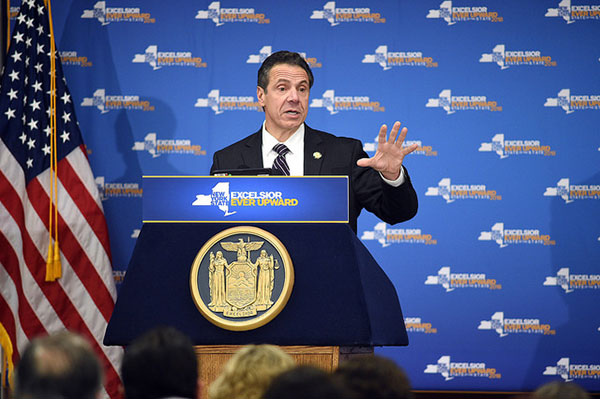
Gov. Cuomo (photo: Kevin P. Coughlin/Governor's Office)
Other high-tax states have considered it, but New York just became the first state to actually do it: revamp its tax code to mitigate the new $10,000 federal cap on deducting state and local taxes (SALT). As part of the new state budget, the Legislature enacted the Governor’s plan for a new voluntary 5% payroll tax New York employers can opt into. It would exempt their employees from paying state income tax, and thereby help keep them below the federal cap.
But the new payroll tax has many detractors, including the New York Business Council, which called many of its provisions unworkable, the New York chapter of the National Federation of Independent Business, which said its members feared it sets the stage for a tax hike on small businesses, and experts convened by the Manhattan Institute, who point out it will penalize commuters from New Jersey and Connecticut. Many predict that only a few small, well-heeled firms will be able to take advantage of it, and many worry the IRS will simply close down the loophole Cuomo just opened.
These objections are all well-founded, but there’s a bigger, more fundamental problem with the scheme: payroll taxes hurt job growth.
In theory, employers who opt into the tax will be made whole because they can pass the cost onto workers by lowering wages 5%. Workers will be made whole since they wouldn’t pay state income tax, and it would help them stay below the federal deductibility limit on SALT. All together, it’s supposed to be a wash.
But in practice it doesn’t work that way. Wages are “sticky” and notoriously hard to pull back once workers attain a certain number on their pay stubs. In a large workforce, getting all employees to accept a nominal 5% pay cut will be a nightmare. Even for small firms with few workers, existing contracts, minimum wage, and competition for sought-after employees will bedevil an across-the-board pay cut. As the New York State Department of Taxation and Finance warned, if employers can't pass the full tax bill onto employees, their net labor costs go up. That drives hiring down.
The new payroll tax doesn't exist in a vacuum, but as part of the larger tax environment, which includes high federal payroll taxes that already inhibit job and economic growth.
They are the biggest taxes a large majority of Americans pay, and the most regressive, squeezing workers who don’t earn enough money to pay income tax or benefit from income tax cuts. Paying payroll taxes lowers workers’ earnings and curtails consumer spending and economic growth. Even so, Congress refused to cut them when it cut federal income and corporate taxes (though Senators Lee and Rubio tried).
Federal payroll taxes also distort relative prices of labor versus. non-labor inputs to business (energy, materials and land) making hiring artificially expensive and consumption artificially cheap. The distortion amounts to over $1 trillion a year (the amount federal payroll taxes raise), or about 5.4% of GDP.
That’s a big, structural drag on jobs that has resulted in a big, structural (though largely hidden) overhang of joblessness. There’s a shocking fact hiding in plain sight in the rosy Bureau of Labor Statistics unemployment charts: out of 257 million non-institutionalized American adults, over 100 million don’t have jobs.
Of those, 95 million aren’t counted as “unemployed;” they’re just considered outside the workforce. That’s legitimate for people who are retired, or who aren’t able or don’t chose to work. But many tens of millions of them, including millions in New York, aren’t working because they lack job opportunity, due in significant part to the corrosive effects of payroll taxation.
To whatever extent firms adopt it, New York's new payroll tax will only compound these problems.
Instead, payroll tax should be cut to boost jobs, both at the federal and state levels, like Colorado did. Since 2008, Colorado’s Job Growth Tax Credit has refunded state payroll tax for job creating businesses. It brought thousands of high-quality jobs to the state and grew its tax base.
Revenue lost from cutting payroll taxes could be replaced with non-labor taxes on resource consumption, waste, inefficiency and pollution. That’s a tax reform approach known as payroll tax shifting. According to the bipartisan group Get America Working!, which I advise, it would reverse payroll tax’s longstanding distortions, roughly doubling the job-creating effects of cutting payroll taxes alone, creating tens of millions of jobs nationwide. In New York, non-labor taxes on consumption we want to limit could raise state revenues and fund tax relief for individuals hurt by the federal deductibility cap.
Which non-labor taxes exactly is a topic for the next budget debate. But there is no lack of options. How about getting serious about collecting the 20% of New York sales tax that still goes unpaid? Or adopting real congestion pricing instead of the quarter-measure in this year’s budget? Or considering the state carbon tax designed by NYRenews that would raise $7 billion annually, help meet New York’s climate goals, and stimulate renewables sector jobs?
New York’s new payroll tax is aimed at downstate, high-paying firms. It might or might not help a narrow band of them at the cost of undercutting job growth. But New York needs a tax policy that boosts employment statewide, including upstate. That’s why we need a tax overhaul that takes the burden off employment and puts it on harmful consumption, waste and pollution.
***
Stephen Kent is president of the public interest PR practice KentCom LLC and consults for the bipartisan employment policy group Get America Working!
***
Have an op-ed idea or submission for Gotham Gazette? Email This email address is being protected from spambots. You need JavaScript enabled to view it.